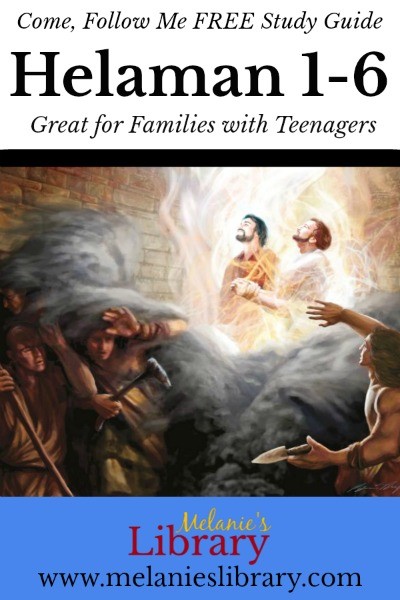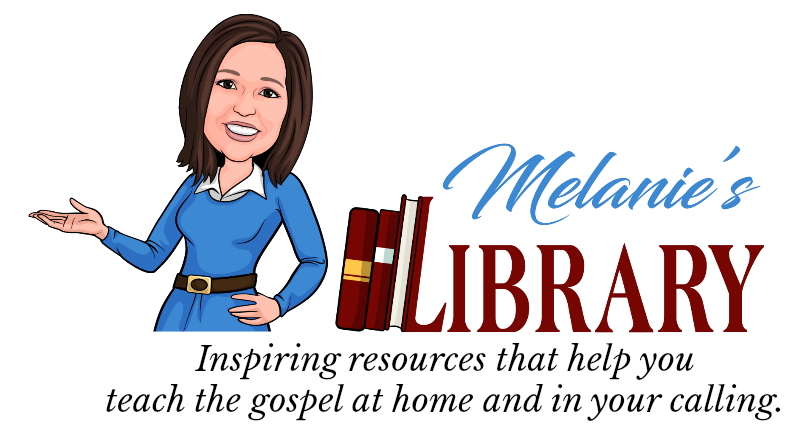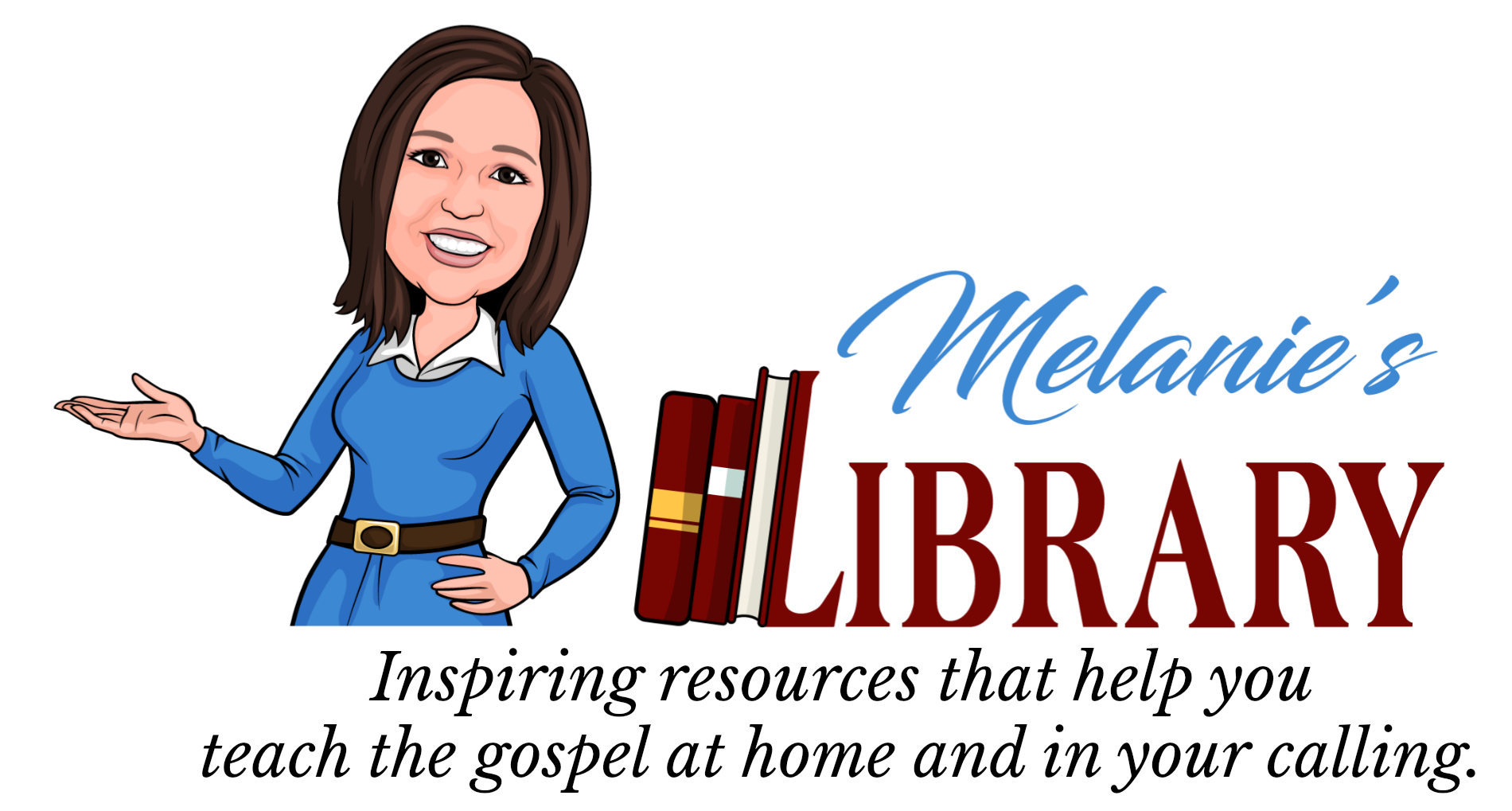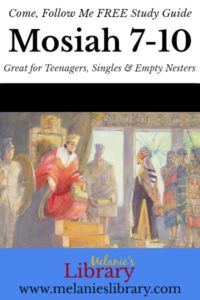Come, Follow Me Daily Study Guide for the week of August 17-23, 2020 covering Helaman 1-6. For personal and/or family study of the scriptures, geared towards families with teenagers, single adults, and empty nesters.

*This is a suggested outline that coincides with the Come, Follow Me manual. There is not just one right way when it comes to studying the scriptures. Everyone should study in a way that is best for them, but I do hope that you find these outlines helpful.
**I highly suggest getting a scripture journal. Throughout the year there will be several times that I will suggest jotting something down in your scripture journal. These are also great for writing down any impressions or “Aha” moments that you might have as you study the scriptures.
***A free PDF DOWNLOAD of the Study Guide is available at the bottom of this post, making it easy for those who’d like to print out a copy. OR you can add Melanie’s Library to your mobile device home screen by following these instructions, click HERE
****SONGS – For a list of suggested songs for each day of the week, be sure and check out the blog called Music for Latter-day Life by clicking HERE

FHE DAY
Start the week off right with a Family Home Evening that is focused around the upcoming week’s Come, Follow Me. Sign up for the Teach Me FHE email group and receive an FHE outline delivered right to your inbox every Sunday morning. Sign up at the bottom of this post.

THRIVING SPIRITUALLY WITH EVIL ALL AROUND
BACKGROUND
QUOTE BY M. RUSSELL BALLARD:
“The Book of Mormon teaches that secret combinations engaged in crime present a serious challenge, not just to individuals and families but to entire civilizations. Among today’s secret combinations are gangs, drug cartels, and organized crime families. The secret combinations of our day function much like the Gadianton robbers of the Book of Mormon times. They have secret signs and code words. They participate in secret rites and initiation ceremonies. Among their purposes are to ‘murder, and plunder, and steal, and commit whoredoms and all manner of wickedness, contrary to the laws of their country and also the laws of their God’” (Standing for Truth and Right, General Conference October 1997.)
What are some serious challenges we face today, not only as individuals and families but as an entire civilization, due to the impact of secret combinations?
SCRIPTURE
READ: Helaman 2:1-11 for an example of the evil done by the Gadianton robbers
- What motives did Gadianton, Kishkumen, and their band of robbers have? (vs 5, 8)
- Why do you think “secret combinations” is a good name for this band of robbers?
- How was their purpose thwarted? (vs 9)
(Optional) For insight as to why Helaman’s servant was justified in killing Kishkuman, watch this short video by clicking HERE
MINI LESSON
QUOTE BY PRESIDENT EYRING:
“President Thomas S. Monson, has declared, ‘Today, we are encamped against the greatest array of sin, vice, and evil ever assembled before our eyes.’ Would you be surprised to learn that President Monson uttered those words [over] 50 years ago? If we were encamped against an unprecedented array of wickedness back then, how much more so does evil threaten us today?” (Armed with Righteousness)
Just as we are surrounded by evil today, the people in the book of Helaman were also surrounded by evil as they dealt with political intrigue, bands of robbers, rejection of the prophets, pride, and disbelief. And yet through it all, there were still humble followers of Christ who were so abundantly blessed that even the church leaders were astonished.
READ: Helaman 3:25
How did they do it? How did they stay strong while their civilization began to decline and fall apart? The same way any of us stay strong today – by building our lives upon the rock of our Redeemer.
READ: Helaman 5:12
How do you build your life upon the rock of our Redeemer?
(The following object lesson is taken from Scripture Study for Latter-day Saint Families)
OBJECT LESSON: Tie a small weight (like a bolt or washer) to a piece of string. Also find a long candle.
Hold up the candle and the string and ask, “How could you make this string into a candle?”
Explain that a candle maker would take a wick (like the string) and dip it in melted wax. It’s then dipped in water to cool the wax. This dipping process is done back and forth until the desired thickness of the candle is achieved.
READ: Helaman 3:35
What does the making of a wax candle have to do with the word “wax” in that scripture?
How is becoming like the Savior a gradual process like making a candle?
PONDER & DISCUSS
What can we do so that we can be like the humble people in Helaman’s day and not only survive but thrive spiritually?
PRESIDENT EYRING GOES ON TO SAY:
“Seeing our day, Nephi ‘beheld the power of the Lamb of God, that it descended upon the saints of the church of the Lamb, and upon the covenant people of the Lord, who were scattered upon all the face of the earth; and they were armed with righteousness and with the power of God in great glory’ (1 Nephi 14:14; emphasis added).
“How do we arm ourselves with righteousness and power? We keep the Sabbath day holy and honor the priesthood. We make and keep sacred covenants, work on our family history, and attend the temple. We strive continuously to repent and plead with the Lord to ‘apply the atoning blood of Christ that we may receive forgiveness of our sins’ (Mosiah 4:2). We pray and serve and testify and exercise faith in Jesus Christ.” (Armed with Righteousness)
ADDITIONAL RESOURCES (optional)
CONFERENCE TALK: Standing for Truth and Right
FIRST PRESIDENCY MESSAGE: Armed with Righteousness
ENSIGN ARTICLE: Jesus Christ: Our Sure Foundation
NEW ERA ARTICLE: A Sure Foundation
VIDEO: The Rock of Our Redeemer

REMEMBER, REMEMBER, REMEMBER
BACKGROUND
(Taken from Come, Follow Me Through the Book of Mormon)
OBJECT LESSON: Get a box and fill it with 20-30 random things from around the house. Don’t let anyone else see what’s inside.
When you’re ready, open the box and have family members look inside at the same time for 10 seconds as they try to memorize as many items as possible.
Close the box, and have them sit for 2 minutes quietly trying to remember as many items as they can.
After 2 minutes, have them write down in their scripture journals everything they can remember without showing anyone or discussing it with anyone. This should take 60-90 seconds.
Have them go through together and share what they wrote.
What similar items did they have? Why do you think these items stuck out?
What unique items did they have? Why did some remember these but others didn’t?
Did anyone write down something that’s not in the box?
SHARE QUOTE:
If you could ask an apostle what the most important word in the dictionary is, what do you think he would say?
President Spencer W. Kimball said:
“When you look in the dictionary for the most important word, do you know what it is? It could be remember. Because all of us have made covenants … our greatest need is to REMEMBER. That is why everyone goes to sacrament meeting every Sabbath day – to take the sacrament and listen to the priests pray that we ‘may always REMEMBER him and keep his commandments which he has given us.’ …REMEMBER is the word. (“Circles of Exaltation” BYU, 28 June 1968; emphasis added)
SCRIPTURE/MINI LESSON
In Helaman 5, Helaman explained to his sons Nephi and Lehi why he gave them their names.
READ: Helaman 5:5-14 and mark/count each time you see the word remember.
How many are there? (15)
In your scripture journals, write an answer to the following question:
What feelings do you have for Jesus Christ that you hope you never forget?
OBJECT LESSON REPEAT: Do the same object lesson again with the same items, and see how much better everyone does.
PONDER & DISCUSS
- Why do you think you did so much better the second time with the memory game?
- What are some of the things we do over and over again in the Church? Why?
- Is anyone in your family named after an ancestor? Perhaps share with your family the reason why someone was named after a certain ancestor or share a story of an ancestor that carries your last name that you are proud of and admire. Talk about remembering and honoring the names we carry, including the name of the Savior.
- How can remembering examples from the scriptures and our righteous ancestors help us make good choices?
- The Book of Mormon includes over 200 references to remembering. Consider the many things we are counseled to remember. Among the most important, we should remember that redemption comes through the Lord Jesus Christ. What can you do to better remember the Savior?
ADDITIONAL RESOURCES (optional)
FIRST PRESIDENCY MESSAGE: Always Remember Him
ENSIGN ARTICLE: Three Things to Remember
VIDEO: Why Did Helaman Want His Sons to Remember to Build Upon the Rock (2:13)
BYU SPEECH: Always Remember Him by Ulisses Soares

YOU CAN’T TAKE IT WITH YOU WHEN YOU GO
BACKGROUND
VIDEO: STUDIO C’s New Year’s Resolution (4:05), click HERE
In the video, Matt’s goal was to get as much stuff as he could by stealing other people’s stuff. His focus was on the stuff.
What are the negative affects if Matt doesn’t stop?
What was Mallory’s New Year’s Resolution? (a good deed daily)
Where should our focus be – get as much stuff as possible or serving others?
SCRIPTURE
READ: Helaman 5:8 *Cross-reference this with Alma’s teaching to his son Corianton in Alma 39:14
Helaman teaches that we should be working towards obtaining things that are “eternal, and which fadeth not away”. What modern applications can we make with this teaching? What are some things that we treasure today that are not of eternal worth?
MINI LESSON/PONDER & DISCUSS
(Adapted from New Era article Enough Stuff, Five Tips for Tackling Materialism By David A. Edwards)
We all need stuff—stuff to wear, stuff to eat, stuff for home, stuff for school. And, of course, beyond the necessities there’s also the stuff we want but don’t really need, as well as the stuff we dream about but could never afford. There’s big stuff and little stuff, girl stuff and guy stuff, stuff for work and stuff for play, stuff for now and stuff for later. It seems the world is filled with stuff.
If we’re not careful, we can have a hard time seeing past all that stuff. Material possessions (both those we have and those we want) can obstruct our view of who we really are and what life is really about.
Here are 5 Tips for Tackling Materialism
1.Know Who You Are – To get teens to buy their products, some companies use cunning advertising techniques targeting the greatest teenage insecurities—fitting in, being “cool,” body image, and so on. By doing so, they distort true identity and hijack our natural development of self-image and personality. As children of our Heavenly Father, we have a divine identity and potential, but Satan wants us to forget this fact. When we doubt our divine nature and lose confidence in ourselves, we are more prone to fill the void with worldly things.
DISCUSS: What can we do to remind ourselves that we are much greater than our worldly possessions? What can we do to help others remember their divine nature and build confidence in themselves? When helping others remember their divine nature and build confidence, does that help us as well? Why or why not?
2. Know Where You’re Going – In referring to material things, the country song “Trailer Hitch” sings, “You can’t take it with you when you go; Never seen a hearse with a trailer hitch.” This is scriptural as well. Refer to the scriptures you just read, Helaman 5:8 and Alma 39:14, where it said “you cannot carry them with you.” So where should our focus be? The Savior has told us, “Seek not the things of this world but seek ye first to build up the kingdom of God” (Joseph Smith Translation, Matthew 6:38).
DISCUSS: Can you think of one or more things that do not have eternal value that you think you will miss when you leave this world? Do any of those things, or anything we can buy in this world, compare to the gift of eternal life?
3. Be Grateful – Researchers have pointed out that teens who develop a sense of thankfulness are able to reduce the negative effects of the materialism that surrounds them. And modern prophets have also taught that gratitude can transform our lives. President Gordon B. Hinckley taught: “Walk with gratitude in your hearts. … Be thankful for the wonderful blessings which are yours. … Be thankful to your parents. … Thank the Lord for His goodness to you. … Let a spirit of thanksgiving guide and bless your days and nights. Work at it. You will find it will yield wonderful results.”
DISCUSS: Why do you think Pres. Hinckley counseled us to “work at it?” Does being grateful take work? What can you do to develop a “spirit of thanksgiving”?
4. Think Outside Yourself – Material things, along with the ways they are marketed, move our focus onto ourselves rather than others. The focus on self and the stuff of this world does not bring happiness. In fact, modern research seems to have verified that (1) you can’t buy happiness and (2) a focus on others can bring greater personal satisfaction (see “The High Price of Materialism” by Tim Kasser and “Consumerism and Its Discontents” by Tori DeAngelis). As Elder Joseph B. Wirthlin taught, “We are happiest when our lives are connected to others through unselfish love and service.”
DISCUSS: Name one thing you can do in the next 24 hours that focuses on someone else and not yourself. After you accomplish this act of service, write down how it felt to think of someone else other than focusing on yourself.
5. Be Wise – The Savior told His Apostles, “I send you forth as sheep in the midst of wolves: be ye therefore wise as serpents, and harmless as doves” (Matthew 10:16). In other words, we should be innocent but not naïve; we should understand the ways of the world without being worldly. This teaching can be applied to materialism. According to some research, we can avoid developing materialistic attitudes if we are more aware of the selling intent of advertising and marketing. That is, if we constantly remind ourselves that the ads we see are just trying to get us to buy stuff, we’re less likely to buy into the message that stuff is all-important.
CHALLENGE: This week pay attention to the ads that you see and be more aware of what they put in their ads with the intent to get you to buy their product.
Again, we all need some stuff, and most stuff is neither good nor bad in and of itself. Neither is most advertising. But over time the incessant drone of materialism can influence our attitudes and thoughts and cause us to forget the Lord and His commandments, as well as our true selves.
ADDITIONAL RESOURCES (optional)
CONFERENCE TALK: Where Your Treasure Is
ENSIGN ARTICLE: Where Is My Treasure?

GENERAL CONFERENCE DAY
Study a recent General Conference talk. A great way to study a conference talk is to have your own conference issue of the Ensign and a highlighter. Listen to the talk and as you listen, highlight the part(s) that stands out to you. Then after the talk, review and/or share and discuss what you have highlighted.
THIS WEEK’S TALK: Come unto Christ—Living as Latter-day Saints By Elder John A. McCune, click HERE

CATCH UP DAYS
Do one of the days that you missed OR any of the additional resources listed.
Yours Truly,

P.S. For more Come, Follow Me resources, check out my post Your Ultimate Guide to Come, Follow Me. It lists over 100 Come, Follow Me resources that are available online starting with the church’s resources at the top. You can find it by clicking HERE.
P.P.S. Sign up here for the Teach Me FHE email group and receive FHE outlines delivered right to your inbox every Sunday morning.
Disclaimer: Melanie’s Library is a participant in the Amazon Services LLC Associates Program. An affiliate advertising program designed to provide a means for sites to earn advertising fees by advertising and linking to amazon.com.







